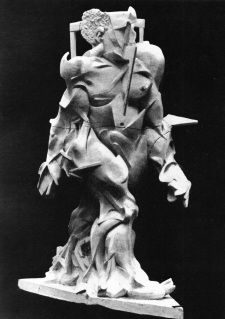Oct 22, 2017
It's easy to misunderstand this series and to see it as a 'deal with the devil' show, a supernatural show, or even a dark comedy. But this is the opposite of comedy; it is tragedy. Specifically, an allegorical tragedy about the consequences of desire.
Western cultures have newspaper cartoon series with simple themes: Dilbert is about the absurdities of the workplace; in Charlie Brown life will put you in your place but is ultimately rewarding. Warau Salesman comes from a Japanese newspaper cartoon series whose theme is apparently about the ways in which desire can damage your life.
In the West we have 'the
...
green-eyed monster' as a personification of envy; in Japan Moguro Fukuzuo is the pale, clammy personification of desire who arises when a person becomes dissatisfied with their lot in life. It usually begins small, with a wistful sigh that life be just a bit easier in some way. Thus desire is born, and Moguro appears. Just by changing your behavior life CAN be a bit easier. You may have second thoughts, but with a sudden shock, your desire will force you onward. Sometimes, desire offers you a way to continue to make things easier, as long as you stick to a few simple rules. But it's the nature of desire that you will break the rules, because desire tends to grow. Sometimes the ending is comical, more ironic than morbid, more poetic justice than traumatic. Always desire grins at you with heavily-lidded eyes that speak of self-indulgence and of a cunning that is greater than yours. The ending is never quite what the victim wanted, but their cold consolation is that they are victims of themselves, they have been led astray by their own heart.
Why would anyone be interested in a show like this? Compare it to the popular American TV franchise "Law and Order:" crimes are shown and the criminals often caught, but the victims rarely end up better than before. Tragedy as a genre has been with us since classical Western times, and their expressive power is suggested by the longevity of the Hamlet and Oedipus archetypes. As a genre, Tragedy lets you watch and be warned. Or you can watch and say that you would never put yourself in such a situation, though the Buddhist philosophy that has heavily influenced Japan would say otherwise. Desire's laugh is not an evil cackle, it is a whoop of surprise and sudden self-awareness: I never thought this is how it would turn out, I never thought this would happen to ME.
If you are interested in a series that explores the everyday concerns of individuals in a complex, highly-structured society, this series is for you. If you'd like to know more about the kinds of things Japanese society finds shameful, inappropriate, or degrading, then this series is for you. If you seek an allegory of spiritual struggle worthy of "Pilgrim's Progress," then this series is for you. Otherwise, may your heart lead you elsewhere.
Reviewer’s Rating: 8
What did you think of this review?
Nice
 0
0
Love it
 0
0
Funny
 0
0
Confusing
 0
0
Well-written
 0
0
Creative
 0
0Show all
